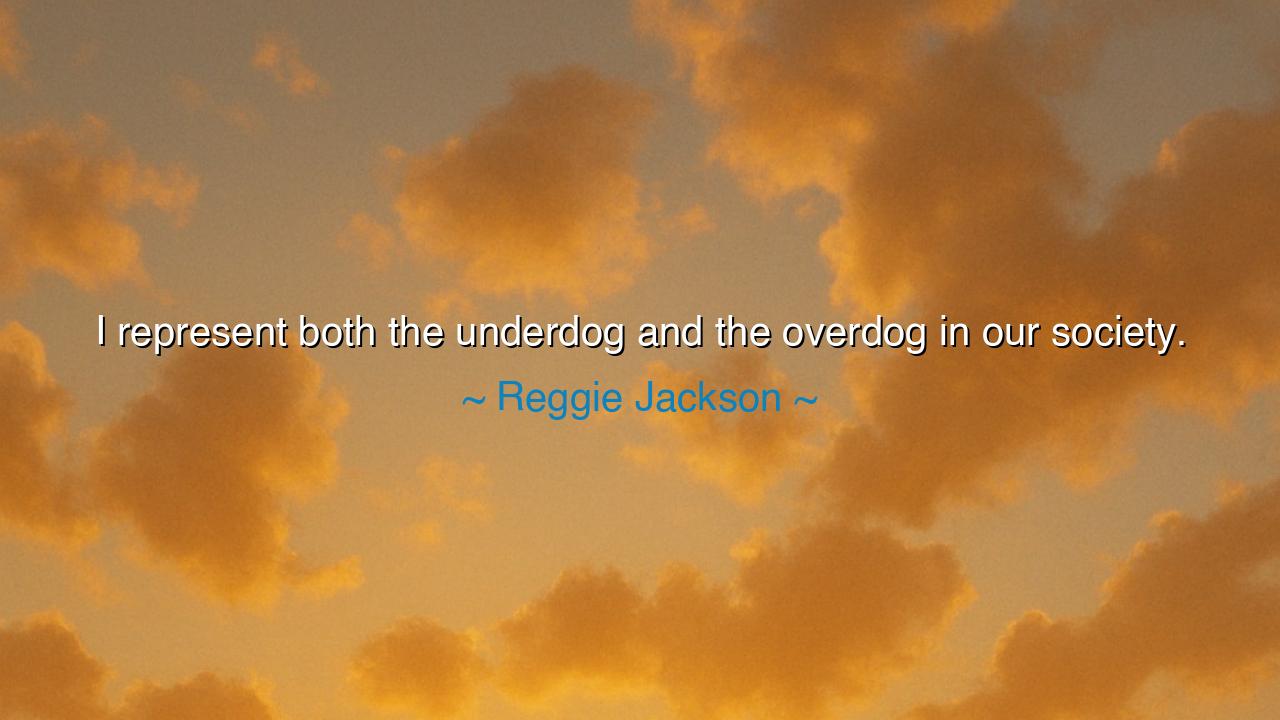
I represent both the underdog and the overdog in our society.






Hear the bold words of Reggie Jackson, the great slugger of baseball: “I represent both the underdog and the overdog in our society.” These words are not boast alone, but a paradox filled with wisdom. For in them he declares that he embodies the struggles of those who begin at the bottom, the underdog, and yet also the triumph of those who rise to power, the overdog. He is both—one who knows hardship and also the glory of victory. His voice carries the lesson that within a single life can dwell the extremes of human destiny: weakness and strength, obscurity and fame, struggle and dominance.
The origin of this saying lies in Jackson’s career, where his journey mirrored the archetype of the hero. Born into modest circumstances, he fought to prove himself in the world of professional sport, a field where talent alone is not enough, and every swing of the bat is tested by scrutiny and doubt. He was at times dismissed, doubted, even scorned—the life of the underdog. Yet he ascended, becoming “Mr. October,” the man of clutch performances, the hero who thrived under the greatest pressure, feared and respected alike—the position of the overdog. To live both is to know the full arc of human endeavor.
The ancients, too, revered those who could embody such duality. Consider the tale of David, shepherd boy and warrior king. As a youth, he stood as the underdog before Goliath, mocked for his size and doubted by his peers. Yet by faith and courage, he slew the giant, later ruling Israel as a mighty king, the overdog who commanded nations. But because he once was weak, he never forgot the plight of the humble. In his dual role, David embodied the same truth Jackson spoke: the greatness of a man lies in understanding both sides of fortune.
History offers us another echo in Abraham Lincoln, born in a humble log cabin with little education, mocked as crude and unpolished. He was the quintessential underdog, rising through hardship to power. Yet as President of the United States, he became the overdog—the leader of armies, the wielder of immense authority. But Lincoln’s greatness lay not in forgetting his roots; it was in using the empathy of the underdog to temper the power of the overdog, guiding his nation with humility and strength.
The meaning of Jackson’s words is therefore profound: to represent both the underdog and the overdog is to bridge the gap between the powerless and the powerful, to remind society that triumph and struggle are bound together. The man who knows both can speak for both—the poor who dream of rising, and the mighty who must be reminded of humility. Such a figure becomes a living symbol of the human condition, for life exalts us one day and humbles us the next.
What lesson then shall we take from this? That we must not despise the lowly seasons of life, for in them we gain the wisdom of the underdog—resilience, hunger, empathy. Nor must we squander the seasons of strength, for in them we hold the responsibility of the overdog—leadership, influence, justice. Each of us may walk both paths at different times, and the measure of our greatness is in how we carry ourselves in both.
Therefore, children of the future, engrave this teaching upon your hearts: remember the underdog when you are strong, and remember the strong when you are weak. Let your victories not blind you to compassion, nor your struggles rob you of hope. For to embody both, as Reggie Jackson declared, is to live fully, to speak for all, and to become a bridge in society between the powerless and the powerful. In this balance, wisdom is found, and through it, true greatness endures.






AAdministratorAdministrator
Welcome, honored guests. Please leave a comment, we will respond soon